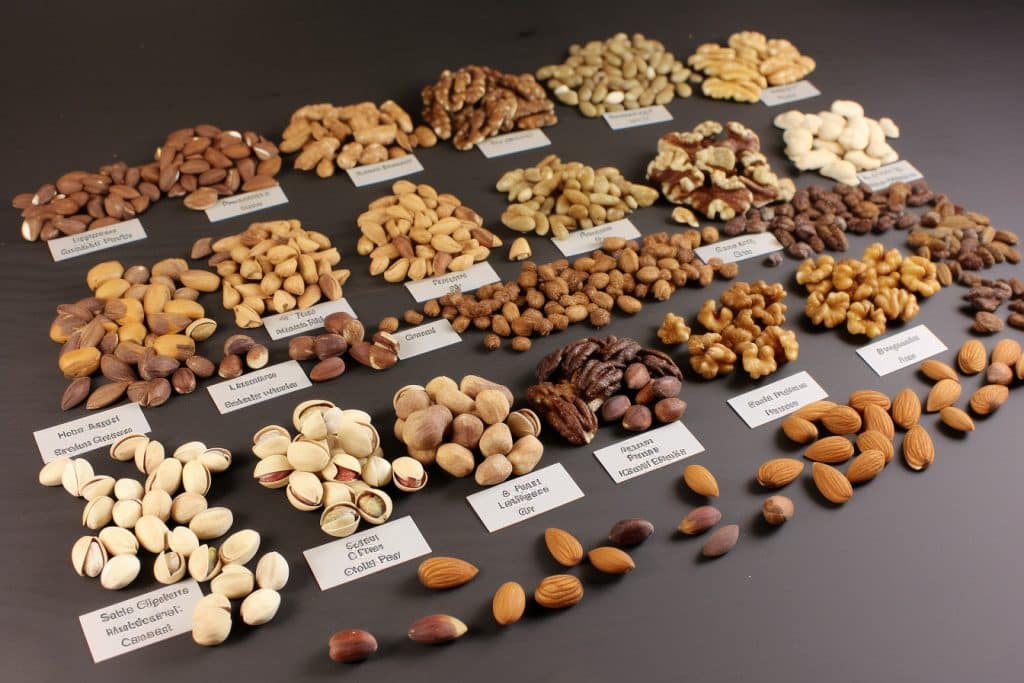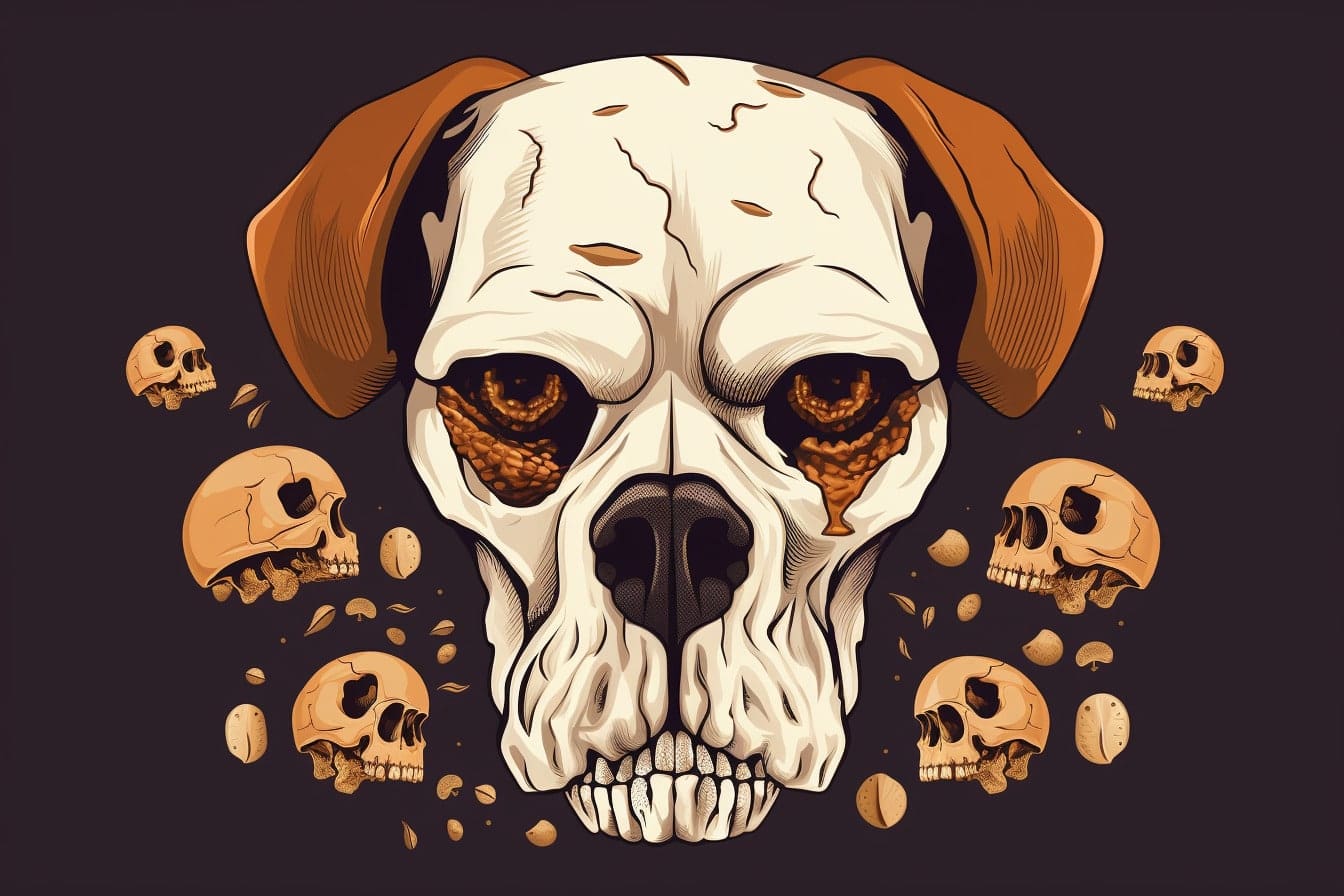The Nuts and Bolts of Canine Nutrition: A Comprehensive Guide to Nuts Toxic to Dogs
While nuts may be a nutritious and delicious snack for us humans, it's important to remember that not all nuts are safe for our four-legged pals. In fact, some can even be downright dangerous.
As pet owners, it's our responsibility to ensure the safety and well-being of our furry friends. In this guide, we'll dive deep into understanding whether all nuts are dangerous to dogs or if there are some that can be a part of their diet without causing any harm.
Unleashing the Nutty Truth: Are All Nuts Toxic to Dogs?

You might be wondering if every type of nut poses a threat to your furry friend's health, so let's dive into the nutty truth and find out.
While it's true that some nuts can cause canine health risks when ingested, not all nuts are dangerous for dogs. It's essential to distinguish between harmful nuts for dogs and those considered safe so that you can provide your beloved pet with a healthy diet while also satisfying their cravings.
1. **Harmful Nuts for Dogs:** Some nuts should never be given to dogs due to their high toxicity levels, which may lead to severe health issues or even death. Macadamia nuts, walnuts, pecans, and black walnuts are among these types of harmful nuts toxic to dogs.
2. **Safe Nuts for Dogs (in moderation):** On the other hand, some nuts pose insignificant risk when consumed in small quantities by dogs—these include peanuts (unsalted and without shells), cashews (cooked or roasted), and almonds (although they may still cause stomach upset).
3. **Nut Toxicity in Dogs:** Nut toxicity varies depending on the type of nut consumed; symptoms may range from vomiting and diarrhea to tremors, seizures, or even paralysis.
Remember that moderation is key when it comes to feeding your dog any kind of treat outside their regular diet – even ‘safe' nuts should only be given occasionally as they can still contribute excess calories leading to weight gain or obesity-related issues in pets.
The Peculiar Case of Peanuts: Are They Safe for Dogs?
While peanuts may seem like a harmless treat, it's crucial to understand their potential dangers for our furry friends.
When discussing canine nutrition, peanuts are often considered a controversial topic due to the various opinions on whether they're safe for dogs or not.

In general, peanuts are not toxic nuts for dogs like macadamia nuts and can be given in moderation as long as they are unsalted and unflavored.
However, feeding large quantities of peanuts regularly could lead to health issues such as obesity, pancreatitis, and allergies.
It's essential to remember that every dog is different, and what might be suitable for one might not be ideal for another.
It's vital to consider each dog's individual dietary needs before introducing any new treats into their diet. For those still unsure about including peanuts in their dog's diet and nuts in general, consulting a veterinarian is always the best course of action.
This will ensure that we make informed decisions keeping our beloved pets' health and safety at the forefront of all we do.
Almonds: A Crunchy Treat or a Hidden Threat?
Picture your pup eagerly wagging their tail as they munch on a crunchy almond, but is it really safe for them to enjoy this popular snack?
While almonds are not as toxic to dogs as some other nuts, like macadamia nuts or walnuts, there are still risks associated with feeding them to our furry friends.
Almonds can pose hazards both in terms of potential choking and digestive issues, as well as the fact that they contain a high amount of fat which can lead to health problems like pancreatitis.
It's important for pet owners to be aware of these dangers and weigh the risks before deciding whether or not to share almonds with their canine companions.
First and foremost, whole almonds present a choking risk due to their size and shape, especially for smaller breeds.
Additionally, because almonds are difficult for dogs to digest properly, consuming them could result in gastrointestinal distress such as vomiting or diarrhea.
Moreover, nut consumption poses a risk for dogs developing pancreatitis – an inflammatory condition that arises from excessive intake of fats.
So, while it may be tempting to share those tasty treats when you see those puppy dog eyes staring up at you longingly, remember that sometimes saying no is the kindest thing we can do for our beloved pets.
Walnuts: The Dark Side of the Nut Family for Canines
You might be surprised to learn that walnuts can pose a real danger for your furry friend, despite their popularity as a tasty treat for humans.

Walnuts definitely fall into the category of those that should be avoided at all costs.
When ingested by our canine companions, these innocent nuts can cause nut poisoning that may lead to severe health complications or even death.
The reasons behind this toxicity are twofold: walnuts contain a toxin called juglone which is harmful to dogs; secondly, mouldy walnuts can produce tremorgenic mycotoxins that can lead to seizures and other neurological issues.
It's crucial that we remain informed about the potential dangers lurking in everyday foods like walnuts.
If you suspect your dog has consumed any amount of walnuts or is showing signs of nut poisoning (such as vomiting, diarrhea, tremors, or difficulty walking), don't hesitate to contact your veterinarian immediately for guidance and treatment options.
Hazelnuts and Dogs: A Love-Hate Relationship?
Though walnuts pose serious risks to our furry friends, what about hazelnuts and their potential impact on dogs' health?
When it comes to hazelnuts and dogs, the relationship between the two is a bit more complicated than with other nuts. While canines aren't necessarily allergic to hazelnuts as they are with some other nut varieties, there still remains a possibility of nut allergies in dogs that owners should be aware of. In general, if given in moderation and if your dog does not have an existing allergy or intolerance, most experts agree that it's safe for canines to consume them.
However, it's important to note that even though can dogs eat hazelnuts without immediate harm, there are still some factors that pet owners should consider before adding them into their dog's diet.
First and foremost is the fat content present in these nuts: high-fat snacks like hazelnuts can lead to pancreatitis in dogs if consumed excessively. Additionally, whole hazelnuts may present a choking hazard for small pups or those who tend to gulp down food without chewing properly; therefore, opting for nut free dog treats might be a safer option for such pets.
So, while hazelnuts don't hold the same dangers as walnuts when it comes to canine consumption, it is best for pet owners to exercise caution and opt for healthier alternatives specifically designed for their four-legged companions.
The Danger Zone: Nuts that are Highly Toxic to Dogs
By becoming informed about these nuts toxic to dogs, we'll be better equipped to keep our dogs safe and healthy while enjoying their favorite treats.
Macadamia Madness: Why These Nuts are a No-Go for Dogs

It's crucial to be aware of the risks associated with macadamia nuts and our dogs, as these harmless treats can lead to serious health issues for dogs. Macadamia nuts are one of the few nuts toxic to dogs, and their consumption can result in a condition commonly known as ‘macadamia madness.'
This is why it's essential to keep these nuts out of reach and ensure they don't make their way into your dog's diet. Macadamia madness is characterized by various symptoms that can severely affect your dog's overall well-being.
To help you stay informed on this topic, we've listed some key points to remember about macadamia nuts and canine nutrition:
– Macadamia nuts contain an unknown toxin that can cause neurological symptoms in dogs.
– Symptoms of macadamia toxicity include vomiting, ataxia (loss of coordination), weakness or paralysis in the hind limbs, tremors, fever, and abdominal pain.
– These symptoms usually appear within 12 hours after ingestion and may last up to 48 hours.
– In severe cases, complications such as dehydration or electrolyte imbalance can occur due to prolonged vomiting or diarrhea.
– If you suspect your dog has ingested macadamia nuts or is showing any signs of toxicity, contact your veterinarian immediately for prompt treatment.
Beware the Stealthy Pistachio: A Sneaky Toxic Treat
You might be surprised to learn that pistachios, while delicious for humans, can pose a hidden danger to your furry friend.
While not as toxic as macadamia nuts or black walnuts, pistachios still carry risks when consumed by dogs. The main concern is their high fat content, which can lead to pancreatitis – a painful and potentially life-threatening condition.
To keep your dog safe from nuts toxic to dogs like pistachios, it's important to stay vigilant about what they're eating and avoid sharing human snacks with them. Keep an eye out for signs of distress like vomiting, diarrhea, or lethargy after consuming any kind of nut.
Cashews: The Hidden Dangers Lurking in Your Nut Bowl
Don't judge a book by its cover – cashews may seem harmless, but they hide potential dangers for your furry friend in that innocent-looking nut bowl, it's essential to understand the risks associated with feeding them cashews and other types of nuts.

As responsible dog owners, we must educate ourselves on the hazards of certain nuts to ensure our pets remain healthy and happy.
Cashews and Canine Health: Cashews contain elevated levels of fat, which can lead to obesity and pancreatitis if consumed in large quantities by dogs. Additionally, salted or flavored cashews can pose even more significant health risks due to their high sodium content and potentially harmful additives.
Dangers of Nuts to Dogs: Some nuts, like macadamia nuts and black walnuts, are highly toxic to dogs, causing severe symptoms such as vomiting, diarrhea, tremors, fever, and even death if not treated promptly.
Safe Nuts for Dogs: Peanuts (unsalted) and plain peanut butter without added sugar or xylitol are considered safe treats for dogs in moderation; however, it's crucial always to monitor your dog's reaction when introducing new foods into their diet.
When the Tail Stops Wagging: Signs Your Dog Has Eaten a Toxic Nut

It's heart-breaking when our furry friends accidentally consume something dangerous, so it's crucial to recognize the signs that they've ingested nuts toxic to dogs.
While some nuts may pose little or no risk to dogs, others can be extremely harmful and even fatal.
In this section, we'll discuss the tell-tale signs your dog has eaten nuts toxic to dogs and what to do if you suspect your canine companion is at risk.
1. **Gastrointestinal issues**: One of the first symptoms of nut poisoning in dogs is gastrointestinal distress. This can manifest as vomiting, diarrhea, loss of appetite, or abdominal pain. If your dog exhibits any of these symptoms after consuming nuts, it's important to contact your veterinarian immediately.
2. **Weakness and lethargy**: Dogs experiencing nut toxicity may become weak and lethargic due to the stress on their bodies from the toxins present in certain nuts such as macadamia nuts. They might struggle with coordination or have difficulty standing up or walking around.
3. **Hyperthermia**: Another danger of macadamia nuts to dogs is an increase in body temperature called hyperthermia. You might notice excessive panting or drooling as your dog tries to cool down.
If you suspect your dog has consumed nuts toxic to dogs, don't hesitate to seek veterinary advice for dogs eating nuts right away – time is of the essence!
Be prepared with information about which type(s) of nut(s) were ingested and how much was consumed when contacting your vet for guidance on next steps.
Remember: prevention is key! To avoid potential hazards related to canines ingesting harmful substances like nuts and raisins, always store them safely out of reach from curious paws and educate yourself about which foods are safe for your four-legged friend before giving them any new treats or table scraps.
From Ruff to Rough: Common Physical Symptoms of Nut Toxicity
Now, let's delve deeper into the common physical symptoms that can manifest in dogs due to nut toxicity.
When it comes to nuts toxic to dogs and canine nutrition, there are several physical symptoms that you should keep an eye out for. Some of these symptoms include vomiting, diarrhea, weakness, tremors or shaking, increased body temperature (hyperthermia), and an elevated heart rate.
In more severe cases of nut toxicity, your dog may experience seizures or even collapse. These symptoms may vary depending on the type of nut ingested and the amount consumed.
It's essential to stay vigilant and monitor your dog's behavior closely if you suspect they have eaten a harmful nut. Acting quickly will go a long way in ensuring your furry friend stays healthy and happy!
Tails of Caution: Case Studies of Nut Toxicity in Dogs
You might be surprised to learn that 25% of dog owners report their pets have accidentally consumed nuts, which can lead to serious health issues in our furry friends.

In this section, titled ‘Tails of Caution: Case Studies of Nut Toxicity in Dogs,' we will delve into real-life examples where dogs have ingested nuts and the outcomes experienced by these beloved pets. By examining these case studies, we hope to provide a deeper understanding of the risks associated with nut toxicity in dogs and offer guidance on emergency care for dogs after nut ingestion.
One such case study involves a young Golden Retriever named Duke who mistakenly consumed a handful of macadamia nuts left on his owner's coffee table. Within hours, Duke began exhibiting signs of distress such as vomiting, weakness, tremors, and an inability to walk properly.
His concerned owners rushed him to their local veterinarian who quickly recognized the symptoms as consistent with macadamia nut toxicity. Thanks to his owner's quick thinking and prompt veterinary intervention, Duke received appropriate treatment and made a full recovery within a few days.
This tale serves as an important reminder for all dog owners about the potential dangers posed by certain types of nuts in their pet's environment and highlights the importance of seeking immediate medical attention if your dog exhibits symptoms suggesting nut toxicity.
Paws, Plan, and Proceed: Steps to Take Following Nut Consumption
After your furry friend has consumed a potentially harmful nut, it's crucial to act swiftly and follow the appropriate steps to ensure their safety and well-being. In our comprehensive guide to nuts toxic to dogs, we've covered everything you need to know about canine nutrition and how various nuts can impact your pet's health.
Now, let's discuss our ‘Paws, Plan, and Proceed' method that outlines the necessary steps to take following nut consumption.
First and foremost, evaluate the situation by determining which type of nut your dog ingested – as some are more harmful than others – and how much they consumed. It's essential to remain calm during this process; remember that you're not alone in dealing with this situation.
Our guide on canine nutrition provides detailed information on nuts toxic to dogs so that you can quickly assess whether immediate action is required or if monitoring their behavior for any signs of distress will suffice. If in doubt, always consult your veterinarian for guidance on managing potential risks associated with nut intake in dogs.
By implementing these measures promptly after an incident occurs, you'll be better equipped to protect your beloved pet from harm while fostering a deep sense of care and responsibility for their well-being.
The Vet is Your Pet's Best Bet: When to Seek Professional Help
So, your pooch's eaten a nutty snack and you're panicking like there's no tomorrow. That's when it's time to call in the professionals – your trusted veterinarian.
The vet is your pet's best bet when it comes to dealing with any potential health issues arising from consuming nuts toxic to dogs or any other harmful substances. Canine nutrition can be a tricky subject, especially since some nuts are safe for dogs in small quantities while others can cause serious harm. When faced with such uncertainties, seeking professional help is always the safest route to ensure the well-being of your furry friend.
Knowing when to seek out professional assistance is essential for every responsible pet owner who wants nothing but the best for their beloved companions – after all, our subconscious desire for serving others extends beyond just humans!
Canine Kitchen Patrol: Keeping Your Nut Bowl Out of Paw's Reach
It's crucial to keep those tempting nut bowls away from your furry friend, as many nuts can pose serious health risks to our beloved pups. Canine nutrition is a vital aspect of ensuring their overall well-being and longevity, so it's essential that we prevent them from ingesting nuts toxic to dogs.

One way to do this is by making sure that our nut bowls are placed out of paw's reach. Here are some tips to help you maintain a canine-safe kitchen environment:
– Store your nut bowl in a high cabinet or on a sturdy shelf where your dog cannot access it.
– Consider using childproof locks on cabinets containing nuts or other potentially harmful foods.
– Regularly check countertops and tables for stray nuts that may have fallen out of the bowl.
By following these simple precautions, you'll be able to provide the best possible care for your dog while still enjoying the tasty benefits of nuts in your own diet.
Safe Snacking: Nut-Free Treats Your Dog Will Love
Safe snacking is essential for promoting optimal canine nutrition and maintaining a healthy diet.
Nut-free treats are an excellent way to reward good behavior and show love without exposing them to potential toxins found in some nuts.
When searching for suitable dog treats, look for products made from natural ingredients such as sweet potatoes, pumpkin, or even lean meats like chicken or turkey.
Avoid treats containing artificial additives or preservatives, as these can be harmful to your dog's health over time.
Homemade nut-free treats are another fantastic option; try baking wholesome biscuits made from whole wheat flour, oats, and peanut butter (remembering that peanuts are technically legumes and not true nuts).
By providing high-quality nut-free treats alongside a balanced diet tailored toward their specific needs, you'll be well on your way to ensuring proper canine nutrition and a happy, healthy pup!
Thoughts
It's important to be aware of these dangers, as prevention is always better than cure.
Remember, when it comes to our beloved pets, being nut-savvy can make all the difference between a happy, healthy pup and a dangerous trip to the vet.
So, let's keep those nuts toxic to dogs out of reach and give our dogs a safe environment to thrive in.
FAQs
What nuts are poisonous to dogs?
There are some nuts toxic to dogs. The most dangerous include macadamia nuts and black walnuts, which can cause severe symptoms such as vomiting, increased temperature, inability to walk, and even tremors. In addition, while not technically a nut, almonds can pose a choking hazard and upset your dog's stomach. If your dog ate nuts and you're worried about potential toxicity, it's essential to contact your vet immediately.
Are all nuts safe for dogs?
No, not all nuts are safe for dogs. Some, like macadamia nuts and black walnuts, are toxic to dogs. Other nuts, such as almonds and cashews, can cause digestive upset if eaten in large quantities. Even Brazil nuts, while not toxic per se, are high in fat and can lead to pancreatitis if your dog consumes too many. If you find yourself thinking, “My dog ate nuts, what should I do?” you should reach out to your vet for advice.
What nuts can dogs eat and not eat?
When it comes to the question “Are nuts toxic to dogs?”, there's a range of answers. Dogs can safely consume some nuts, like peanuts and hazelnuts, in small quantities. However, they should not eat macadamia nuts, black walnuts, or almonds due to toxicity and choking hazards. Brazil nuts, while not toxic, should also be avoided due to their high-fat content. If your dog has eaten these nuts, seek immediate veterinary advice.
Can dogs eat cashews and almonds?
Cashews can be safe for dogs in small quantities, but they are high in fat and can cause stomach upset or pancreatitis if consumed in substantial amounts. Almonds, on the other hand, are not safe. They are not easily digested by dogs and can cause gastrointestinal upset or even become a choking hazard. If you're considering feeding your dog nuts, remember that not all nuts and seeds are safe for dogs. And if you're thinking, “My dog ate nuts, what should I do?” the best answer is always to consult with your vet.
Can dogs have Brazil nuts?
Brazil nuts are not included in nuts toxic to dogs, but they are high in fat, which can lead to health issues such as pancreatitis if your dog eats too many. If you're considering feeding your dog Brazil nuts or any other type of nuts, it's important to remember that not all nuts are safe for dogs. When in doubt about “Are nuts toxic to dogs?”, it's best to consult with a veterinarian.
Can dogs eat nuts and raisins?
While some nuts may be safe for dogs in moderation, raisins are a definite no. Raisins, and their dried counterpart, grapes, are highly toxic to dogs and can cause sudden kidney failure. So, even if a nut is safe for dogs, if it's mixed with raisins, it should be avoided. If your dog has ingested nuts and raisins, it's essential to contact your vet immediately.
Can dogs eat nuts and seeds?
Some nuts and seeds are safe for dogs in moderation, but others can be harmful. For example, sunflower seeds, if shelled, can be a healthy treat for your dog. However, other seeds, like apple seeds or apricot pits, can be toxic. The same applies to nuts: some are safe, like peanuts, while others are toxic, like macadamia nuts.



